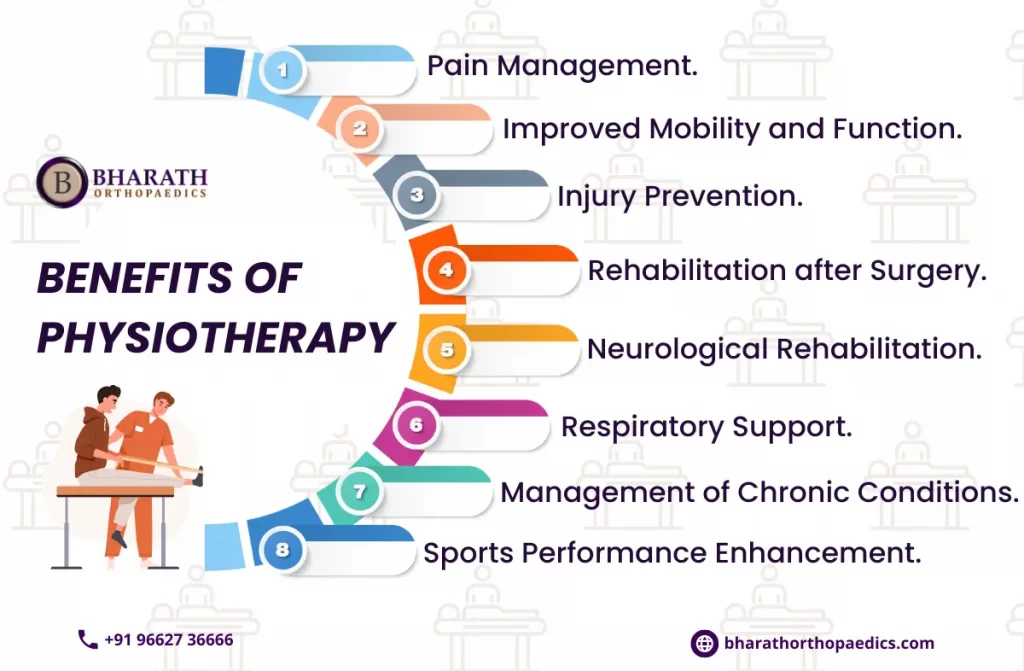Physiotherapy, a dynamic and essential healthcare profession, plays a pivotal role in aiding individuals to regain their mobility, alleviate pain, and enhance overall function. Rooted in a profound understanding of anatomy, physiology, and biomechanics, physiotherapists employ an array of techniques to provide physiotherapy in Chennai for addressing diverse conditions, ranging from injuries to disabilities.
This article delves into the multifaceted world of physiotherapy, exploring its methodologies, benefits, various specializations, and the considerations to keep in mind when selecting a physiotherapist.
What Is Physiotherapy?
Physiotherapy, also known as physical therapy, is a healthcare profession focused on restoring and maintaining physical function, mobility, and quality of life. Physiotherapists assess, diagnose, and treat conditions that affect movement and function, whether caused by injury, disease, aging, or other factors. Treatment approaches include manual therapy, exercise prescription, electrotherapy, and education on lifestyle modifications. Physiotherapy aims to alleviate pain, improve strength and flexibility, rehabilitate after injury or surgery, and prevent future injury. It is personalized to each individual’s needs, promoting independence and enhancing overall well-being through holistic, evidence-based practices.
How to Choose the Best Physiotherapist in Chennai?
Choosing the best physiotherapist in Chennai involves several key considerations:
1. Qualifications: Ensure they are qualified and registered.
2. Specialization: Look for expertise in your specific condition.
3. Experience: Prefer those with a good track record.
4. Location: Accessibility to their clinic is crucial.
5. Patient Reviews: Check testimonials and feedback.
6. Treatment Approach: Confirm they use evidence-based practices.
7. Facilities: Assess the clinic’s amenities and equipment.
8. Cost and Insurance: Verify affordability and coverage options.
9. Referrals: Seek recommendations from trusted sources or healthcare providers.
Read also: Physiotherapy for Knee Pain
Understanding Physiotherapy in Chennai
Physiotherapy encompasses a spectrum of interventions designed to amplify movement and function. Drawing on their extensive knowledge, physiotherapists provide the best physiotherapy in Chennai to help individuals recover from injuries, manage pain, and cultivate holistic health.
By tailoring treatments to individual needs, these professionals employ a blend of techniques, including exercise regimens, massage therapies, and cutting-edge electrotherapy, to facilitate a person’s journey toward well-being.

Common Physiotherapy Treatments
Common physiotherapy treatments include:
- Manual Therapy: Hands-on techniques like joint mobilization, manipulation, and soft tissue massage to improve mobility and reduce pain.
- Exercise Prescription: Tailored exercise programs to strengthen muscles, improve flexibility, and enhance overall function.
- Electrotherapy: Modalities such as ultrasound, TENS (Transcutaneous Electrical Nerve Stimulation), and electrical stimulation to manage pain and promote healing.
- Heat and Cold Therapies: Application of heat packs or ice packs to reduce inflammation, alleviate pain, and aid recovery.
- Education and Counseling: Advice on posture correction, ergonomic techniques, and lifestyle modifications to prevent recurrence of injuries and promote wellness.
Read also: Physiotherapy Treatment for Knee Ligament Injury
Various Types Of Physiotherapy Services
Physiotherapy services encompass a diverse range of treatments tailored to address various health conditions and goals:
- Pain Management: Utilizing techniques to alleviate acute and chronic pain through various therapeutic modalities.
- Musculoskeletal Rehabilitation: Targeting injuries or conditions affecting muscles, bones, joints, and soft tissues.
- Neurological Rehabilitation: Addressing disorders like stroke, spinal cord injuries, multiple sclerosis, and Parkinson’s disease.
- Cardiopulmonary Rehabilitation: Supporting recovery post-cardiac surgery or managing conditions like COPD.
- Sports Rehabilitation: Enhancing performance, preventing injuries, and rehabilitating athletes.
- Pediatric Physiotherapy: Treating developmental delays, cerebral palsy, and musculoskeletal conditions in children.
- Geriatric Physiotherapy: Addressing age-related mobility issues, falls prevention, and osteoporosis management.
Importance of Physiotherapy
Physiotherapy is crucial for enhancing physical health and quality of life through targeted interventions:
- Rehabilitation: Helps individuals recover from injuries, surgeries, or medical conditions by improving mobility, strength, and function.
- Pain Relief: Offers effective pain management strategies to alleviate discomfort and enhance daily activities.
- Prevention: Educates on injury prevention, promotes proper posture, and advises on ergonomic techniques to reduce risks.
- Holistic Care: Considers the overall well-being of patients, addressing physical, psychological, and social aspects of health.
- Enhanced Mobility: Improves range of motion and flexibility, crucial for maintaining independence and mobility.
- Sports Performance: Assists athletes in recovering from injuries and optimizing performance through specialized rehabilitation programs.
What are the risks of physiotherapy?
Physiotherapy is generally safe, but risks can include:
1. Increased Pain: Temporary discomfort during exercises or therapies.
2. Muscle or Joint Injury: Potential strains or aggravation of existing conditions.
3. Allergic Reactions: Rare reactions to substances like topical creams or materials used in treatments.
4. Exacerbation of Symptoms: Temporary worsening of pain or inflammation.
5. Rare Complications: Such as nerve damage or vascular injuries from invasive techniques like acupuncture or manual therapy.
6. Fatigue or Overuse: Overdoing exercises leading to fatigue or delayed recovery.
Patients should communicate openly with their physiotherapist to minimize risks and ensure treatments are tailored to their individual needs.
Types of Therapies Provided by Physiotherapists
Physiotherapists provide a range of therapies tailored to individual needs:
- Manual Therapy: Hands-on techniques like joint mobilization, manipulation, and soft tissue massage.
- Exercise Prescription: Customized exercise programs to improve strength, flexibility, and mobility.
- Electrotherapy: Modalities such as ultrasound, TENS (Transcutaneous Electrical Nerve Stimulation), and electrical stimulation for pain relief and tissue healing.
- Heat and Cold Therapies: Application of heat or cold packs to reduce pain and inflammation.
- Education and Counseling: Advice on posture correction, ergonomic techniques, and lifestyle modifications.
- Hydrotherapy: Exercises performed in water to facilitate movement and reduce joint strain.
Exploring Diverse Specializations
Physiotherapy branches into distinct specializations, each tailored to address specific needs:
- Sports Physiotherapy: Athletes benefit from the physiotherapy in Anna Nagar, which aids in injury recovery and performance enhancement, optimizing their physical capabilities.
- Occupational Therapy: Designed for individuals with disabilities or injuries, this form of physiotherapy at a reasonable physiotherapy cost in Chennai empowers them to participate actively in their daily routines.
- Neurological Physiotherapy: Focused on stroke survivors and those with neurological injuries, this specialization aids in regaining movement and function.
- Pediatric Physiotherapy: Children with developmental delays or disabilities receive customized care to enhance their movement and overall abilities.
- Geriatric Physiotherapy: Geared toward seniors, this form of physiotherapy in Chennai safeguards mobility and independence as individuals age.
Benefits of Physiotherapy
Physiotherapy offers numerous benefits for physical health and well-being:
- Holistic Care: Considers mental and emotional aspects, promoting overall wellness and quality of life through personalized, evidence-based treatments.
- Pain Relief: Effective management of acute and chronic pain through targeted treatments and techniques.
- Improved Mobility: Enhances flexibility, range of motion, and overall mobility, crucial for daily activities.
- Rehabilitation: Facilitates recovery post-injury, surgery, or illness, restoring strength and function.
- Prevention: Educates on injury prevention, corrects posture, and promotes healthy movement patterns.
- Enhanced Sports Performance: Optimizes conditioning, addresses sports injuries, and improves athletic performance.
Services offered by Physiotherapy
Physiotherapy provides a range of services aimed at restoring and enhancing physical function. Assessment and diagnosis guide tailored treatment plans encompassing therapeutic exercises to improve strength, flexibility, and coordination. Manual therapy techniques address musculoskeletal issues, while modalities like ultrasound and electrical stimulation aid pain management.
Rehabilitation post-surgery or injury is a core service, that promotes optimal recovery. Physiotherapists also specialize in neurological rehabilitation, addressing conditions like stroke or Parkinson’s disease. Respiratory physiotherapy improves lung function through breathing exercises. Additionally, education on injury prevention, ergonomic advice, and lifestyle modifications are integral parts of physiotherapy services, fostering holistic well-being and empowering individuals to actively manage their health.
Physiotherapy for different ages
Physiotherapy is tailored to the specific needs of different age groups, addressing a range of health concerns and promoting overall well-being:
Children and adolescents
- Focus on developmental milestones.
- Address musculoskeletal issues.
- Treat sports injuries.
- Improve coordination and motor skills.
- Treat conditions such as scoliosis.
Adults
- Relieve back and neck pain.
- Treat arthritis and joint problems.
- Rehabilitation after surgery or injury.
- Improve posture and ergonomics.
- Treat work-related injuries.
Seniors
- Manage age-related conditions (such as osteoarthritis).
- Improve balance and prevent falls.
- Improve mobility and flexibility.
- Post-surgery rehabilitation.
- Address chronic conditions such as Parkinson’s disease or the effects of stroke.
Personalized physiotherapy plans address specific age-related health challenges and promote optimal physical function and quality of life.
Main procedures and techniques of physiotherapy in Chennai
- Manual therapy: Hands-on techniques to relieve pain and improve mobility.
- Electrotherapy: Use of electrical stimulation for pain relief and muscle stimulation.
- Therapeutic exercise: Tailored exercises to improve strength, flexibility and endurance.
- Ultrasound therapy: Use of sound waves to heal tissue.
- Joint mobilization: Gentle movements to improve joint function.
- Heat and cold therapy: Application of temperature to reduce pain and inflammation.
- Postural Education: Instructions for optimal body alignment to prevent discomfort.
Conclusion
Physiotherapy stands as a valuable healthcare profession, enriching lives by restoring movement and function. Through its myriad approaches, individuals receive personalized care that addresses their unique needs, from reducing pain and enhancing mobility to preventing injuries. You can approach Dr. Bharath at Bharath Orthopaedics to get the best physiotherapy in Chennai who aligns with your goals, facilitating your journey towards improved well-being.
Read also Robotic Knee Replacement in Chennai.




